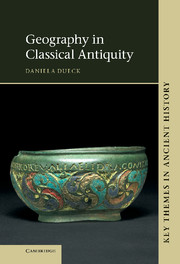Chapter 5 - Geography in practice
Published online by Cambridge University Press: 05 June 2012
Summary
The connection between experience and text
Throughout classical antiquity, people travelled. Men sailed for commercial purposes and on coasting voyages around the Mediterranean; officials travelled by land for administrative purposes at the time of the high Roman Empire; pilgrims made their way to places of religious and cultural significance; wealthy intellectuals went on tourist trips to Athens or Egypt; and military expeditions, such as the Athenian force that sailed to Sicily in 415 bce, or the Roman military expeditions to Britain (led by Caesar in 55 and 54 bce) and to Africa (under Tiberius in 17 ce, to quell the revolt of Tacfarinas), combined land and sea travel. The movement of individuals and groups was thus varied in regard to means of transport, goals, geographical scope and, most important, the written outcome of the experiences.
The ancients, and specifically the Greeks, who were pioneers in intellectual, geographical and scientific endeavours, became acquainted with their world through travel and scientific conjectures, the results of both of which were eventually conveyed in literary form. First came travel. Greek civilization grew up in settlements on islands or near coasts around the Mediterranean, on its European, Asian and African shores and on the Black Sea coastline. This situation required constant maritime journeys to purchase and exchange goods, as well as to meet cultural and social needs. Sailing thus became an integral part of daily life and opened the route for further, planned journeys, which eventually produced an acquaintance with new regions. Naval warfare, which had begun in the late seventh century bce, also developed in the fifth century bce, particularly in response to the Persian invasions. These intentions required familiarity with sea-routes, harbours, coastal topography and other local details, all essential for both merchants and warriors. Travel was also undertaken, even if less often, for pilgrimage (to oracular or healing shrines), to take part in the Olympic and Pythian games, for tourism and for intellectual purposes and encounters. Land journeys too were undertaken for all these purposes, and in the time of the Roman Empire, massive military campaigns and frequent administrative traffic made use of paved routes throughout the Empire. Practical needs were common to all motivations for travel.
- Type
- Chapter
- Information
- Geography in Classical Antiquity , pp. 111 - 121Publisher: Cambridge University PressPrint publication year: 2012



